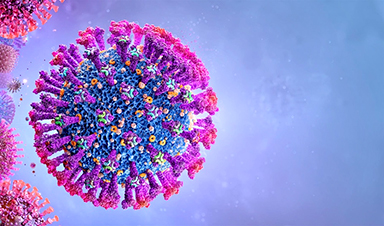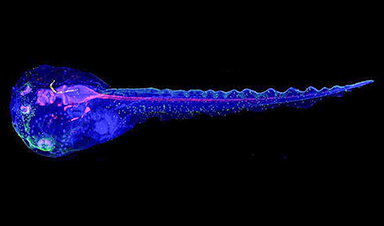Past infection with covid-19 does not necessarily confer protection against future infection, especially when it comes to the delta and omicron variants, researchers have warned.
Wendy Barclay, head of infectious disease at Imperial College London, told an event organised by the Zoe study group1 on 3 February, “Each variant is different from the starting virus, but it’s not necessarily a linear difference. If you can picture in three dimensional space the original Wuhan one sitting in the middle—some of the other variants have sort of gone out from Wuhan but in different directions. The two that are most different from each other are delta and omicron.”
She said people who think their past infection will give them good protection against future variants may be mistaken, and that this is a powerful reason to get vaccinated. “You’re actually better off being vaccinated, even if you get infected on top of that vaccine, as we can see that it broadens out the immune response and gives you potentially better protection against all the other variants that are going to come a little later,” Barclay said.
BA.2
Regarding the omicron variant sub-lineage BA.2, which is now spreading in the UK with more than 1000 confirmed cases reported in England as of 31 January 2022,2 Barclay explained that there are three versions of omicron—BA.1 (the version of omicron that has spread widely around the world), BA.2, and BA.3.
Early data suggested that BA.2 has a slight advantage over BA.1, despite there not seeming to be a huge difference between them, said Barclay. She said both have a “double whammy ability” with a lot of changes in the spike protein, meaning that the antibodies the population has made against vaccines or previous infection are not able to “see the virus very well.” BA.2 may also have some other attributes that make it better at transmitting, which is how it is starting to displace BA.1 in countries such as Denmark.
She suggested that as the “number of slight changes in BA.2 is somewhat less,” BA.1 may have accumulated so many changes that it has “compromised to a degree its own fitness, whereas BA.2 has struck a better balance with the escape from antibodies, while maintaining good transmissibility.”
The UK Health Security Agency has warned that BA.2 has an “increased growth rate” compared with BA.1, and that those with BA.2 are more likely to infect household contacts.
Variant vaccines
Looking at the future of the pandemic and protection against SARS-CoV-2, Barclay discussed the importance of developing vaccines that can protect against many different variants. She said that while many vaccine manufacturers, especially those using mRNA technology, have marketed themselves on the idea that their platform can be rapidly adapted to fit new variants, there is little evidence that this is happening.
“I know that they’ve developed vaccines against beta, but beta has been and gone and we’re now on omicron. I don’t think we’re going to have an omicron vaccine, for the UK anyway, until omicron has been and gone,” Barclay said.
She has suggested that multivalent vaccines designed to work against several variants at once may be the future. Barclay noted, however, that this was a big challenge, and one that has still not been overcome for the likes of influenza. “There are some great ideas that are being tested at the moment, but in the short term I don’t see that happening.”
News
AI matches doctors in mapping lung tumors for radiation therapy
In radiation therapy, precision can save lives. Oncologists must carefully map the size and location of a tumor before delivering high-dose radiation to destroy cancer cells while sparing healthy tissue. But this process, called [...]
Scientists Finally “See” Key Protein That Controls Inflammation
Researchers used advanced microscopy to uncover important protein structures. For the first time, two important protein structures in the human body are being visualized, thanks in part to cutting-edge technology at the University of [...]
AI tool detects 9 types of dementia from a single brain scan
Mayo Clinic researchers have developed a new artificial intelligence (AI) tool that helps clinicians identify brain activity patterns linked to nine types of dementia, including Alzheimer's disease, using a single, widely available scan—a transformative [...]
Is plastic packaging putting more than just food on your plate?
New research reveals that common food packaging and utensils can shed microscopic plastics into our food, prompting urgent calls for stricter testing and updated regulations to protect public health. Beyond microplastics: The analysis intentionally [...]
Aging Spreads Through the Bloodstream
Summary: New research reveals that aging isn’t just a local cellular process—it can spread throughout the body via the bloodstream. A redox-sensitive protein called ReHMGB1, secreted by senescent cells, was found to trigger aging features [...]
AI and nanomedicine find rare biomarkers for prostrate cancer and atherosclerosis
Imagine a stadium packed with 75,000 fans, all wearing green and white jerseys—except one person in a solid green shirt. Finding that person would be tough. That's how hard it is for scientists to [...]
Are Pesticides Breeding the Next Pandemic? Experts Warn of Fungal Superbugs
Fungicides used in agriculture have been linked to an increase in resistance to antifungal drugs in both humans and animals. Fungal infections are on the rise, and two UC Davis infectious disease experts, Dr. George Thompson [...]
Scientists Crack the 500-Million-Year-Old Code That Controls Your Immune System
A collaborative team from Penn Medicine and Penn Engineering has uncovered the mathematical principles behind a 500-million-year-old protein network that determines whether foreign materials are recognized as friend or foe. How does your body [...]
Team discovers how tiny parts of cells stay organized, new insights for blocking cancer growth
A team of international researchers led by scientists at City of Hope provides the most thorough account yet of an elusive target for cancer treatment. Published in Science Advances, the study suggests a complex signaling [...]
Nanomaterials in Ophthalmology: A Review
Eye diseases are becoming more common. In 2020, over 250 million people had mild vision problems, and 295 million experienced moderate to severe ocular conditions. In response, researchers are turning to nanotechnology and nanomaterials—tools that are transforming [...]
Natural Plant Extract Removes up to 90% of Microplastics From Water
Researchers found that natural polymers derived from okra and fenugreek are highly effective at removing microplastics from water. The same sticky substances that make okra slimy and give fenugreek its gel-like texture could help [...]
Instant coffee may damage your eyes, genetic study finds
A new genetic study shows that just one extra cup of instant coffee a day could significantly increase your risk of developing dry AMD, shedding fresh light on how our daily beverage choices may [...]
Nanoneedle patch offers painless alternative to traditional cancer biopsies
A patch containing tens of millions of microscopic nanoneedles could soon replace traditional biopsies, scientists have found. The patch offers a painless and less invasive alternative for millions of patients worldwide who undergo biopsies [...]
Small antibodies provide broad protection against SARS coronaviruses
Scientists have discovered a unique class of small antibodies that are strongly protective against a wide range of SARS coronaviruses, including SARS-CoV-1 and numerous early and recent SARS-CoV-2 variants. The unique antibodies target an [...]
Controlling This One Molecule Could Halt Alzheimer’s in Its Tracks
New research identifies the immune molecule STING as a driver of brain damage in Alzheimer’s. A new approach to Alzheimer’s disease has led to an exciting discovery that could help stop the devastating cognitive decline [...]
Cyborg tadpoles are helping us learn how brain development starts
How does our brain, which is capable of generating complex thoughts, actions and even self-reflection, grow out of essentially nothing? An experiment in tadpoles, in which an electronic implant was incorporated into a precursor [...]





















